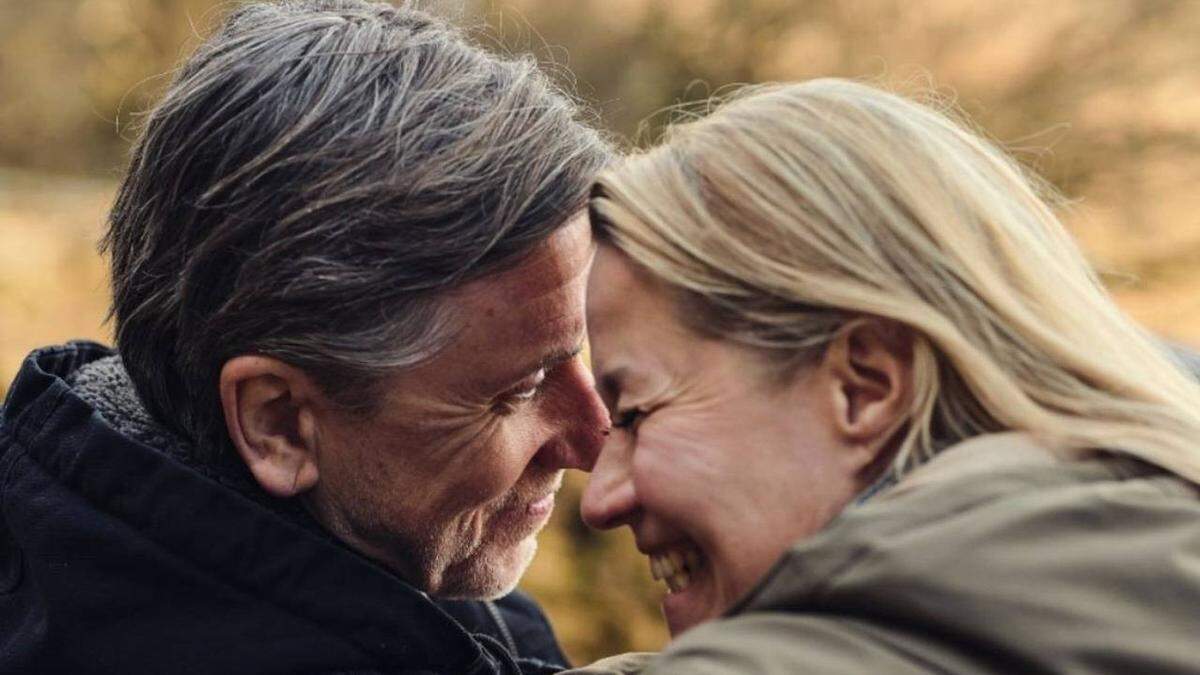The official Luxembourg premiere of Poison on the evening of Tuesday, 11 March was preceded by an homage to one of its leads, Tim Roth. Following some kinds words and a short clip show showcasing his most iconic roles, the English actor spoke directly to the audience at Kinepolis as a guest of honour of the Luxembourg City Film Festival.
Indeed, the audience was in illustrious company. Besides Roth, co-star Trine Dyrholm and the film’s Luxembourg director Désirée Nosbusch, Prime Minister Luc Frieden and Minister of Culture Eric Thill were also in the audience
Director Désirée Nosbusch with actors Tim Roth and Trine Dyrholm at the premier of ‘Poison’ at LuxFilmFest on 11 March © Photo credit: Margaux Gatti/LuxFilmFest
Poison, shot in the historic castle town of Vianden, a historic town, after all, sets a new bar for Luxembourg filmmaking.
Based on a play by Lot Vekemans, the film begins with a divorced couple’s encounter in the graveyard where their son is buried. Thing start off quite awkwardly: they exchange small talk and try to connect, but ultimately can’t overcome the frosty atmosphere of Vianden’s cemetery.
As their first conversation in ten years gains momentum, a lot of the drama in Poison hinges on things left unsaid. Lucas (Roth) walked out on Edith (Dyrholm) not long after their young son’s death. He is haunted by a sense of resignation, she by resentment.
Both embody different kinds of grief. Lucas has done his best to move on, to pick up new creative outlets, to start a new family. Edith, the more tragic character of the two, is emotionally frozen in the moment when she was abandoned. Her resentment towards Lucas is palpable, and she can barely hide it.
The film is little more than a long conversation over the course of a dreary afternoon, meaning that so much of its emotive potential is delivered through its lead actors’ performances. Dyrholm’s escalating bitterness, when met by Roth’s touchy, teary-eyed diffidence, renders many scenes with emotional charge.
The drama, as such, retains a certain dramaturgical quality. The whole thing plays out very much like a play, with its two leads sharing an emotionally claustrophobic setting with nothing to bounce off of but each other.
This is by no means to its detriment. Rather, it simply represents a true transferral from stage to screen. With the added benefit of film cameras, so much drama can be produced and detected in Lucas and Edith’s faces, and the cemetery in Vianden in turn adds a lot to the plot’s elegiac atmosphere.
For a film dependent entirely on a bittersweet (and borderline caustic) chemistry, Poison certainly succeeds as a meditation on grief, both as a universal and deeply lonely experience.
It’s certainly not a very easy movie to watch, given that it deals with the most terrible kind of long-term suffering which, by its very nature, cannot ever really abate. Neither was it a very easy movie to produce, as cast plus crew explained in a post-screening Q&A.
It takes a village to raise a child, and it takes many, many countries to make a movie.
Désirée Nosbusch
Director of ‘Poison’
As Roth told the enraptured audience: “This was one of the hardest films I’ve made, emotionally. And also the most rewarding.”
Roth and Dyrholm both admitted that they found the script daunting. Its difficult subject matter, combined with the sheer amount of text they had to learn, meant that the pair had to rehearse in a hotel room together for two weeks. It also meant that chemistry was crucial. Luckily, so Dyrholm explained, she found Roth to be very supportive in such a challenging role.
More impressively, although she has directed short films before, this was a debut feature for Nosbusch, who is better known as an actress and presenter. Remarking that Poison in particular may not have been the easiest project to start with, she was nevertheless very thankful to her cast and crew.
Further, she added that “it takes a village to raise a child, and it takes many, many countries to make a movie.”
A Luxembourgish, Dutch, and British co-production, one can’t help but feel that Poison nevertheless marks a new filmmaking high in the Grand Duchy specifically. Not only is it a carefully crafted and emotionally charged film; its setting in one of Luxembourg’s most scenic landscapes renders it all the more real.
